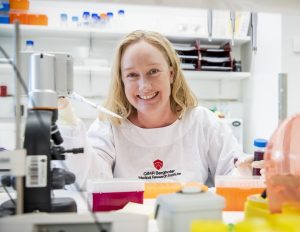A $2 million equipment grant from the Australian Cancer Research Foundation (ACRF) has enabled QIMR Berghofer researchers to establish the ACRF Centre for Optimised Cancer Therapy (ACRF-COCT).
The Centre, led by Professor Steven Lane and Dr Nicola Waddell, will use the latest advances in genomics and technology to better understand the heterogeneity in cancers and help deliver more personalised cancer therapies.
It will encompass treatments for haematological malignancies as well as a range of solid cancers including breast, bowel, brain and ovarian cancers and melanoma.

Professor Vicki Whitehall
Professor Vicki Whitehall, one of the ACRF-COCT lead investigators, told the limbic that the grant provided for high throughput robotics to enhance the capacity and precision of the existing sequencing facility.
It also provided support for functional studies using organoids, spatial analysis, and increased capacity for machine and deep learning.
“We now have really cutting edge, state-of-the-art equipment to look at cancers with this very specific granularity that will really confer a lot of details of the cancers. And it means that we’ll be able to process those samples more rapidly and with greater capacity than we’ve been able to before.”
Professor Whitehall, whose research interest focuses on colorectal cancer, said the testing of potential therapies on patient-derived tumor organoids was quite predictive of clinical outcomes.
“So the goal really is to have this facility where we will be able to collect the samples, grow them in the lab, and then test whatever drugs would be available to the patient. We would then feed the results back to the oncologist to inform choice of therapy with the best chance of success, whilst limiting potential toxicity from drugs that had not killed the cancer cells in the lab.”
She said QIMR Berghofer was recruiting patients with bowel cancer through the Royal Brisbane and Women’s Hospital for biobanking purposes and research developing new therapies.
As well, there were a number of ongoing studies such as the Predicting ChemoRadiotherapy Sensitivity in Rectal Cancer Organoids (PRoSecCO) study for which she is principal investigator.
“Cancers are very variable. They have a lot of different cells and the cells behave differently so even if you find a drug that works, it usually only treats some of the cells in the cancer. So we want to understand everything that’s going on in the patient’s individual cancers to find the right combinations of therapies that are most likely to work in the first instance.”
Professor Lane, group leader of the Gordon and Jessie Gilmour Leukaemia Research Laboratory at QIMR Berghofer, said the ACRF-COCT will be jointly managed by researchers and clinicians from QIMR, the Royal Brisbane and Women’s Hospital and Princess Alexandra Hospital.
He said what makes the Centre unique was its access to extensive samples from patients who are undergoing treatment.
“Vital information about cancer tumour responses will be available, allowing us to inform and validate individualised therapeutic approaches in a clinical setting, ultimately leading to improved treatment options for patients,” he said in a statement.
Dr Waddell, group leader of medical genomics at QIMR Berghofer, said the centre will focus on the dynamic changes that happen during the treatment of cancer.
“By using genomic single cell and spatial technologies, together with big data sets, we hope we can offer alternative treatments, in real time.”
“We will examine patient samples, at the time of surgery, during treatment, and at the completion of treatment to provide a comprehensive view of how different cancers respond to standard chemotherapy; immunotherapy; targeted therapies; and cellular therapies,” she said.